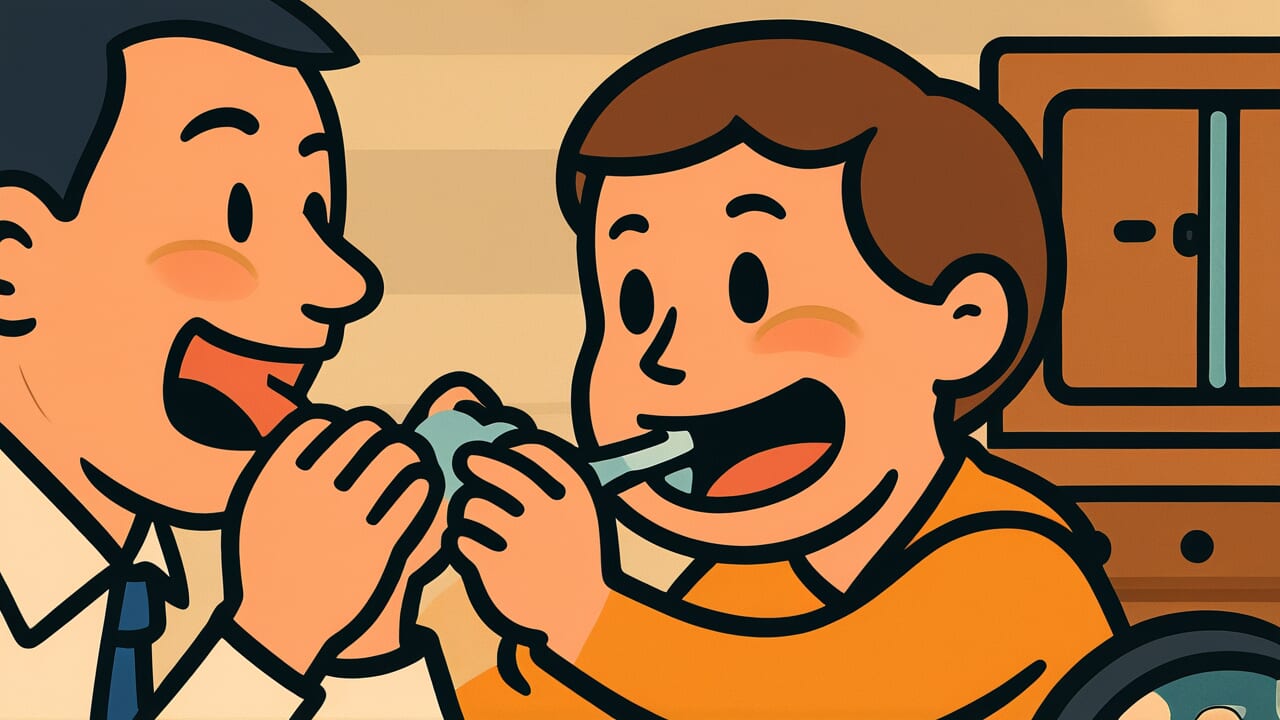How to Read “A child bites with their parent’s back teeth, while others bite with their front teeth”
Oya no okuba de kamu ko wa tanin ga maeba de kamu
Meaning of “A child bites with their parent’s back teeth, while others bite with their front teeth”
This proverb warns that when parents spoil their children, those children will face harsh treatment from others in society.
When parental love becomes overprotective and parents are too gentle with their children’s mistakes and flaws, those children cannot handle the harshness of the real world.
At home, parents treat their children carefully, like chewing slowly with back teeth. But once outside, others deal with them mercilessly, like biting through with front teeth.
This gap becomes a major challenge for children raised with too much indulgence.
People use this proverb when they want parents to reconsider their parenting approach. It teaches that love and spoiling are different things.
True love sometimes requires strictness. Even today, this proverb serves as a warning against overprotective parenting.
If you truly care about your child’s future, you need to show appropriate strictness at home too. This is advice based on deep love for parents.
Origin and Etymology
No clear written records exist about the origin of this proverb. However, we can make interesting observations from how the phrase is constructed.
The contrast between “biting with back teeth” and “biting with front teeth” forms the core of this proverb.
Back teeth chew food slowly and carefully. Front teeth bite through quickly. This physical difference beautifully expresses different parenting attitudes.
Parents biting with back teeth means raising children slowly, gently, and indulgently. Others biting with front teeth means dealing with people quickly and harshly without mercy.
The proverb uses tooth function, something everyone understands through bodily experience, to convey the essence of human relationships.
This proverb likely emerged from common people’s lives during the Edo period. Extended families were normal then.
Adults around children regularly witnessed how parental indulgence affected children’s futures. From such lived experiences, this concrete and understandable expression was born.
The metaphor using teeth, a familiar body part, conveys meaning instantly when heard. This is a truly skillful expression that condenses ancestral wisdom.
Usage Examples
- That child is a typical case of “A child bites with their parent’s back teeth, while others bite with their front teeth,” and apparently struggles at work
- If you spoil your child too much, it becomes “A child bites with their parent’s back teeth, while others bite with their front teeth,” so let’s be strict now
Universal Wisdom
This proverb has been passed down because it addresses a fundamental human contradiction. The purest emotion, parental love, sometimes hinders a child’s growth.
All parents love their children. Because of that love, they want to remove their children’s pain and suffering.
But when that kindness goes too far, children grow up without learning to face difficulties. This is what we might call the paradox of love.
Human society has two realms: the protected space of home and the harsh reality of the outside world.
The gap between these two worlds never changes across time. Children spoiled at home facing reality’s harshness for the first time is a pattern repeated from ancient times to today.
This proverb asks: what is true love? Is love protecting your child’s smile right now?
Or is it nurturing the strength to endure future difficulties? Our ancestors saw that the latter is real love.
Here lies a universal truth: growth that involves pain makes people strong.
When AI Hears This
The game structure itself differs between parent-child relationships and relationships with others. Parent-child is an “infinite game” repeated thousands of times.
Relationships with others tend to be “finite games” of one or a few rounds. This difference creates completely different optimal strategies.
Parents can bite with back teeth, meaning they can be lenient without going all out, because they can expect future cooperation.
In game theory, the “tit-for-tat strategy” works in repeated games. Forgive this time, but be strict if it happens again.
This strategy requires the assumption that the relationship continues. Parents know their relationship with children lasts long-term, so they can accept temporary losses and show tolerance.
This behavior resembles investment.
Meanwhile, others biting with front teeth, meaning responding with full force from the start, is a rational choice.
In one-time relationships, you cannot expect benefits from future cooperation. Rather, if you don’t show strong response initially, you give the other person information that “this person is soft.”
What game theory calls a “credible threat” doesn’t work. So you need to respond strictly from the first encounter.
In other words, both parental leniency and others’ strictness are optimal solutions for their respective relationship structures. Not emotions, but game structure determines behavior.
Lessons for Today
This proverb teaches modern people about the essence of love. If you truly care about someone, you need to believe in their growth.
Sometimes you must interact with strictness.
In modern society, the boundary between kindness and indulgence often becomes blurred. But isn’t true kindness nurturing the ability to live independently?
This applies not just to parent-child relationships, but to all human relationships: bosses and subordinates, teachers and students.
What matters is the balance between protection and challenge. People cannot grow if completely protected or completely abandoned.
Let them experience appropriate difficulties while supporting them when needed. This delicate sense of balance is the attitude that truly cares about someone’s future.
If you have someone around you to protect, consider not just their current comfort but their future strength too.
Sometimes hardening your heart is an expression of deep love. That is the path to making that person truly happy.



Comments